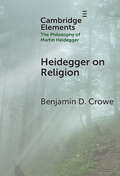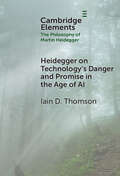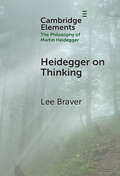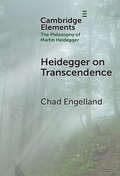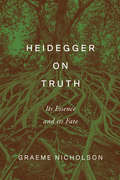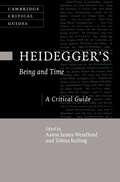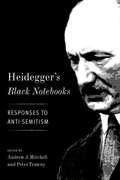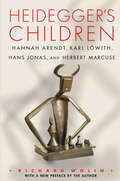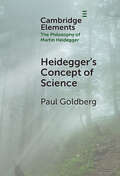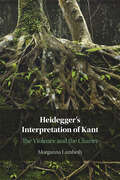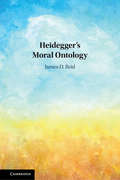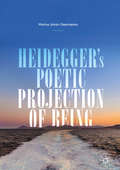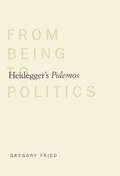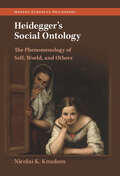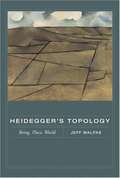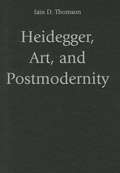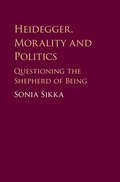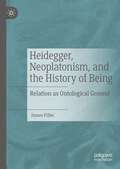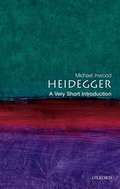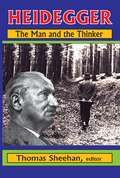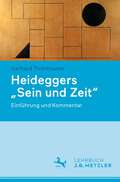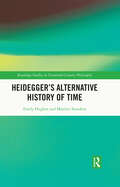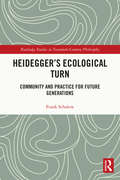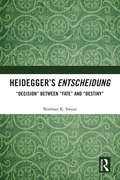- Table View
- List View
Heidegger on Religion (Elements in the Philosophy of Martin Heidegger)
by Benjamin D. CroweThroughout his career, Heidegger explored the religious sides of life in ways that had far-reaching impacts on the thought of his contemporaries and successors. This Element examines three important stops along Heidegger's ways of thinking about religion as the risky performance of life in new spaces of possibility. Section 1 examines Heidegger's 1920–1921 lectures on Paul, while Section 2 turns to the darker period of the late 1930s, exploring how Heidegger reconfigures religion in the context of his “new inception” of thought beyond metaphysics. Finally, Section 3 takes up Heidegger's challenging discussions of the divine in several postwar addresses and essays. In each case, Heidegger argues that we must suspend, bracket, or rescind from our tendencies to order, classify, define, and explain things in order to carry out a venture into a situation of indeterminacy and thereby recast religion in a new light.
Heidegger on Technology's Danger and Promise in the Age of AI (Elements in the Philosophy of Martin Heidegger)
by Iain D. ThomsonHow exactly is technology transforming us and our worlds, and what (if anything) can and should we do about it? Heidegger already felt this philosophical question concerning technology pressing in on him in 1951, and his thought-full and deliberately provocative response is still worth pondering today. What light does his thinking cast not just on the nuclear technology of the atomic age but also on more contemporary technologies such as genome engineering, synthetic biology, and the latest advances in information technology, so-called “generative AIs” like ChatGPT? These are some of the questions this book addresses, situating the latest controversial technologies in the light of Heidegger's influential understanding of technology as an historical mode of ontological disclosure. In this way, we seek to take the measure of Heidegger's ontological understanding of technology as a constellation of intelligibility with an important philosophical heritage and a dangerous but still promising future.
Heidegger on Thinking (Elements in the Philosophy of Martin Heidegger)
by Lee BraverEvery philosophy is a celebration of the fact that being can be thought, that the world around us yields to concepts that join together into arguments which can lead us to new thoughts and new ways of thinking. Heidegger's great talent was to never lose his philosophical wonder at philosophy, to never stop thinking about thinking. Heidegger's early work favors a somewhat pragmatic view of thinking as organized by and around our projects, emphasizing tacit skills over articulate conscious thinking. It also explores stepping back from all projects in dread and wonder. His later thinking is reciprocal rather than autonomous, something we do with and for being instead of something we do to or on beings, which can help overcome contemporary nihilism. After the death of God, we may no longer be able to pray to a divinity, but we can still be the thinkers of being.
Heidegger on Transcendence (Elements in the Philosophy of Martin Heidegger)
by Chad EngellandElements in the Philosophy of Martin Heidegger
Heidegger on Truth: Its Essence and its Fate (New Studies in Phenomenology and Hermeneutics)
by Graeme Nicholson"What is truth?" This famous question received a novel answer from Martin Heidegger, based on the methods of phenomenology. The 1930 address "On the Essence of Truth" takes us on a pathway of thinking that starts from the standard "correspondence theory of truth," and moves into larger discussions on truth, including the freedom of human conduct and choices. Heidegger on Truth is a close reading of a significant article by Heidegger entitled "On the Essence of Truth." The first part is a reading of the 1930 lecture which forms the basis of the article eventually published in 1943 and again, in revised form, in 1949. It is followed by a second part in which Nicolson compares the lecture with its subsequent versions eliciting the subsequent changes and detours of his thoughts on 'truth' over this period. The second part of the book also includes chapters on his interpretation of Plato, scholasticism and the tradition of modern rationalism. Accessibly written, this book is a very thorough examination of Heidegger's thoughts on the concept of "truth."
Heidegger's Being and Time: A Critical Guide (Cambridge Critical Guides)
by Aaron James Wendland Tobias KeilingMartin Heidegger's Being and Time, published in 1927, is widely regarded as his most important work and it has had a profound influence on twentieth-century philosophy. This Critical Guide draws on recently translated and published primary sources as well as the latest developments in Heidegger scholarship to provide a series of in-depth studies of this influential text. Twelve newly-written essays examine the unity of Being and Time; the nature of human communication; truth as a catalyst of cultural transformation; feminist approaches to Being and Time; the essence of authenticity; curiosity as an epistemic vice; the nature of rationality; realism and idealism; the ontological difference; the origin of time; the possibility of death; and the failure of the Being and Time project. The volume will be particularly valuable to students and scholars interested in phenomenology, existentialism, hermeneutics, metaphysics, epistemology, feminism, and ethics.
Heidegger's Black Notebooks: Responses to Anti-Semitism
by Peter Trawny Edited by Andrew J. MitchellFrom the 1930s through the 1970s, the philosopher Martin Heidegger kept a running series of private writings, the so-called Black Notebooks. The recent publication of the Black Notebooks volumes from the war years have sparked international controversy. While Heidegger’s engagement with National Socialism was well known, the Black Notebooks showed for the first time that this anti-Semitism was not merely a personal resentment. They contain not just anti-Semitic remarks, they show Heidegger incorporating basic tropes of anti-Semitism into his philosophical thinking. In them, Heidegger tried to assign a philosophical significance to anti-Semitism, with “the Jew” or “world Judaism” cast as antagonist in his project.How, then, are we to engage with a philosophy that, no matter how significant, seems contaminated by anti-Semitism? This book brings together an international group of scholars from a variety of disciplines to discuss the ramifications of the Black Notebooks for philosophy and the humanities at large. Bettina Bergo, Robert Bernasconi, Martin Gessmann, Sander Gilman, Peter E. Gordon, Hans Ulrich Gumbrecht, Michael Marder, Eduardo Mendieta, Richard Polt, Tom Rockmore, Peter Trawny, and Slavoj Žižek discuss issues including anti-Semitism in the Black Notebooks and Heidegger’s thought more broadly, such as German conceptions of Jews and Judaism, Heidegger’s notions of metaphysics, and anti-Semitism’s entanglement with Heidegger’s views on modernity and technology, grappling with material as provocative as it is deplorable. In contrast to both those who seek to exonerate Heidegger and those who simply condemn him, and rather than an all-or-nothing view of Heidegger’s anti-Semitism, they urge careful reading and rereading of his work to turn Heideggerian thought against itself. These measured and thoughtful responses to one of the major scandals in the history of philosophy unflinchingly take up the tangled and contested legacy of Heideggerian thought.
Heidegger's Children
by Richard WolinMartin Heidegger is perhaps the twentieth century's greatest philosopher, and his work stimulated much that is original and compelling in modern thought. A seductive classroom presence, he attracted Germany's brightest young intellects during the 1920s. Many were Jews, who ultimately would have to reconcile their philosophical and, often, personal commitments to Heidegger with his nefarious political views. In 1933, Heidegger cast his lot with National Socialism. He squelched the careers of Jewish students and denounced fellow professors whom he considered insufficiently radical. For years, he signed letters and opened lectures with ''Heil Hitler!'' He paid dues to the Nazi party until the bitter end. Equally problematic for his former students were his sordid efforts to make existential thought serviceable to Nazi ends and his failure to ever renounce these actions. This book explores how four of Heidegger's most influential Jewish students came to grips with his Nazi association and how it affected their thinking. Hannah Arendt, who was Heidegger's lover as well as his student, went on to become one of the century's greatest political thinkers. Karl Löwith returned to Germany in 1953 and quickly became one of its leading philosophers. Hans Jonas grew famous as Germany's premier philosopher of environmentalism. Herbert Marcuse gained celebrity as a Frankfurt School intellectual and mentor to the New Left. Why did these brilliant minds fail to see what was in Heidegger's heart and Germany's future? How would they, after the war, reappraise Germany's intellectual traditions? Could they salvage aspects of Heidegger's thought? Would their philosophy reflect or completely reject their early studies? Could these Heideggerians forgive, or even try to understand, the betrayal of the man they so admired? Heidegger's Children locates these paradoxes in the wider cruel irony that European Jews experienced their greatest calamity immediately following their fullest assimilation. And it finds in their responses answers to questions about the nature of existential disillusionment and the juncture between politics and ideas.
Heidegger's Concept of Science (Elements in the Philosophy of Martin Heidegger)
by Paul GoldbergThis Element argues that Heidegger's concept of science has two core features. Heidegger critiques a security-oriented concept of science, which he associates with the dominance of physics in modern science and metaphysics and with a progressive resistance among philosophers and scientists to ontological questioning. Meanwhile, Heidegger advances an access-oriented concept of science, on which science is essentially founded on ontological disclosures but also constantly open to the possibility of new revolutionary disclosures. This Element discusses how these commitments develop in Heidegger's early and later thinking, and argues that they inform his views on the history of Western metaphysics and on the possibilities for human flourishing that modernity, and modern science specifically, affords. The Element also discusses Heidegger's dialogue with Werner Heisenberg about quantum physics; and throughout, it highlights points of contact and divergence between Heidegger and other philosophers of science such as Karl Popper, Thomas Kuhn, Paul Feyerabend, and Helen Longino.
Heidegger's Interpretation of Kant: The Violence and the Charity
by Morganna LambethHeidegger has a reputation for reading himself into the philosophers he interprets, and his interpretation of Kant has therefore had little uptake in anglophone Kant scholarship. In this book, Morganna Lambeth provides a new account of Heidegger's method of interpreting Kant, arguing that it is more promising than is typically recognized. On her account, Heidegger thinks that Kant's greatest insights are located in moments of tension, where Kant struggles to articulate something new about his subject-matter. The role of the interpreter, then, is to disentangle competing strands of argument, and to determine which strand is most compelling. Lambeth traces Heidegger's interpretive method across his reading of Kant's Critique of Pure Reason and situates Heidegger's reconstruction of Kant's best line of argument against other post-Kantian readings. She finally shows how Heidegger's deep engagement with Kant sheds light on Heidegger's own philosophical views.
Heidegger's Moral Ontology
by James D. ReidHeidegger's Moral Ontology offers the first comprehensive account of the ethical issues that underwrite Heidegger's efforts to develop a novel account of human existence. Drawing from a wide array of source materials from the period leading up to the publication of Being and Time (1919–1927), and in conversation with ancient, modern, and contemporary contributions to moral philosophy, James D. Reid brings Heidegger's early philosophy into fruitful dialogue with the history of ethics, and sheds fresh light on such familiar topics as Heidegger's critique of Husserl, his engagement with Aristotle, his account of mortality, the role played by Kant in the genesis of Being and Time, and Heidegger's early reflections on philosophical language and concepts. This lively book will appeal to all who are interested in Heidegger's early phenomenology and in his thought more generally, as well as to those interested in the nature, scope, and foundations of ethical life.
Heidegger's Poetic Projection of Being
by Marius Johan GeertsemaThis book investigates the relationship between poetry and ontology in the works of Martin Heidegger. It explains the way in which Heidegger’s dialogue with poetry forms an essential step on the path of overcoming metaphysics and thinking the openness of presence. Heidegger’s engagement with poetry is an important moment in the development of his philosophy—or rather thinking of Being. Being speaks itself poetically in his view. Rather than a logician or a thinker, Being is the first poet.
Heidegger's Polemos: From Being to Politics
by Gregory FriedGregory Fried offers in this book a careful investigation of Martin Heidegger's understanding of politics. Disturbing issues surround Heidegger's commitment to National Socialism, his disdain for liberal democracy, and his rejection of the Enlightenment. Fried confronts these issues, focusing not on the historical debate over Heidegger's personal involvement with Nazism, but on whether and how the formulation of Heidegger's ontology relates to his political thinking as expressed in his philosophical works. The inquiry begins with Heidegger's interpretation of Heraclitus, particularly the term polemos ("war", or, in Heidegger's usage, "confrontation"). Fried contends that Heidegger invests polemos with broad ontological significance and that his appropriation of the word provides important insights into major strands of his thinking -- his conception of the human being, understanding of truth, and interpretation of history -- as well as the meaning of the so-called turn in his thought. Although Fried finds,that Heidegger's politics are continuous with his thought, he also argues that Heidegger's work raises important questions about contemporary identity politics. Fried also shows that many postmodernists, despite attempts to distance themselves from Heidegger, fail to avoid some of the same political pitfalls his thinking entailed.
Heidegger's Social Ontology: The Phenomenology of Self, World, and Others (Modern European Philosophy)
by Nicolai K. KnudsenMany critics and commentators hold that Heidegger had next to nothing to say about human sociality. In this book, Nicolai Knudsen rectifies this popular misconception. Drawing on his influential philosophy of mind, his philosophy of action and his conception of being-with, Knudsen argues that the central idea of Heidegger's social ontology is that we can only understand others, do things with others, and form lasting groups with others if we pre-reflectively correlate their behaviour with our own projects and the world that lies between us. Knudsen then uses this framework to formulate Heideggerian contributions to current debates on social cognition, collective intentionality, and social normativity. He also reinterprets Heidegger's famous concept of authenticity in the light of his social ontological commitments, and shows how Heidegger's affiliation with National Socialism betrays his own best insights into the fundamental structure of social life.
Heidegger's Topology: Being, Place, World
by Jeff MalpasIn this book Malpas follows the development of Heidegger's topology through three stages: the early period of the 1910s and 1920s, through "Being and Time," centered on the "meaning of being"; the middle period of the 1930s into the 1940s, centered on the "truth of being"; and the late period from the mid-1940s on, when the "place of being" comes to the fore.
Heidegger's Way of Being
by Richard M CapobiancoIn Heidegger's Way of Being, the follow-up to his 2010 book, Engaging Heidegger, Richard Capobianco makes the case clearly and compellingly that the core matter of Heidegger's lifetime of thought was Being as the temporal emergence of all beings and things. Drawing upon a wide variety of texts, many of which have been previously untranslated, Capobianco illuminates the overarching importance of Being as radiant manifestation - "the truth of Being" - and how Heidegger also named and elucidated this fundamental phenomenon as physis (Nature), Aletheia, the primordial Logos, and as Ereignis, Lichtung, and Es gibt.Heidegger's Way of Being brings back into full view the originality and distinctiveness of Heidegger's thought and offers an emphatic rejoinder to certain more recent readings, and particularly those that propose a reduction of Being to "sense" or "meaning" and maintain that the core matter is human meaning-making. Capobianco's vivid and often poetic reflections serve to evoke for readers the very experience of Being - or as he prefers to name it, the Being-way - and to invite us to pause and meditate on the manner of our human way in relation to the Being-way.
Heidegger, Art, and Postmodernity
by Iain D. ThomsonHeidegger, Art, and Postmodernity offers a radical new interpretation of Heidegger's later philosophy, developing his argument that art can help lead humanity beyond the nihilistic ontotheology of the modern age. Providing pathbreaking readings of Heidegger's 'The Origin of the Work of Art' and his notoriously difficult Contributions to Philosophy (From Enowning), this book explains precisely what postmodernity meant for Heidegger, the greatest philosophical critic of modernity, and what it could still mean for us today. Exploring these issues, Iain D. Thomson examines several postmodern works of art, including music, literature, painting and even comic books, from a post-Heideggerian perspective. Clearly written and accessible, this book will help readers gain a deeper understanding of Heidegger and his relation to postmodern theory, popular culture and art.
Heidegger, Morality, and Politics: Questioning the Shepherd of Being
by Sonia SikkaHeidegger has often been seen as having no moral philosophy and a political philosophy that can only support fascism. Sonia Sikka's book challenges this view, arguing instead that Heidegger should be considered a qualified moral realist, and that his insights on cultural identity and cross-cultural interaction are not invalidated by his support for Nazism. Sikka explores the ramifications of Heidegger's moral and political thought for topics including free will and responsibility, the status of humanity within the design of nature, the relation between the individual and culture, the rights of peoples to political self-determination, the idea of race and the problem of racism, historical relativism, the subjectivity of values, and the nature of justice. Her discussion highlights aspects of Heidegger's thought that are still relevant for modern debates, while also addressing its limitations as reflected in his political affiliations and sympathies.
Heidegger, Neoplatonism, and the History of Being: Relation as Ontological Ground
by James FillerThis book argues that Western philosophy's traditional understanding of Being as substance is incorrect, and demonstrates that Being is fundamentally Relationality. To make that argument, the book examines the history of Western philosophy's evolving conception of being, and shows how this tradition has been dominated by an Aristotelian understanding of substance and his corresponding understanding of relation. First, the book establishes that the original concept of Being in ancient Western philosophy was relational, and traces this relational understanding of Being through the Neoplatonists. Then, it follows the substantial understanding of Being through Aristotle and the Scholastics to reach its crisis in Descartes. Finally, the book demonstrates that Heidegger represents a recovery of the original, relational understanding of Being.
Heidegger: A Very Short Introduction
by Michael InwoodMartin Heidegger (1889-1976) is probably the most divisive philosopher of the twentieth century: viewed by some as a charlatan and by others as a leader and central figure of modern philosophy. Michael Inwood's lucid introduction to Heidegger's thought focuses on his most important work, "Being and Time," and its major themes of existence in the world, inauthenticity, guilt, destiny, truth, and the nature of time. These themes are then reassessed in the light of Heidegger's later work, together with the extent of his philosophical importance and influence. This is an invaluable guide to the complex and voluminous thought of a major twentieth-century existentialist philosopher.
Heidegger: The Man and the Thinker (New Heidegger Research Ser.)
by Sheehan ThomasMany people consider Martin Heidegger the most important German philosopher of the twentieth century. He is indisputably controversial and influential. Athough much has been written about Heidegger, this may be the best single volume covering his life, career, and thought. For all its breadth and complexity, Heidegger's perspective is quite simple: he is concerned with the meaning of Being as disclosure.Heidegger's life was almost as simple. He was a German professor, except for a brief but significant period in which he supported the Nazi regime. While that departure from philosophy continues to haunt his name and work, one must question whether his thought from 1912 to 1976 should be measured by the yardstick of his politics from May, 1933, through February, 1934. Th is anthology addresses his complex but simple thought and his simple but complex life.In a real sense, Sheehan claims, there is no content to Heidegger's topic and legacy, only a method. But method must not be taken to mean a technique or procedure for philosophical thinking. Rather, the topic of Heidegger's thought and his pursuit of that topic, the "what" and the "how," are one and the same thing.Heidegger writes, "Alles ist Weg," "Everything is way," and man's Being is to be on-the-way in essential movement. Heidegger, argues in our essence we humans are the topic and the point is not to be led there so much as to come to know what we already know and to become what we already are. This brilliant collection confirms this truism, and is an excellent introduction to the work of this seminal thinker.
Heideggers "Sein und Zeit": Einführung und Kommentar
by Gerhard ThonhauserMartin Heideggers „Sein und Zeit“ zählt zu den wichtigsten Werken des 20. Jahrhunderts und übt bis heute großen Einfluss aus. Der vorliegende Kommentar bietet eine systematische Interpretation dieses Werks mit Blick auf das Gesamtprojekt, von dem Heidegger nur die ersten beiden der geplanten sechs Abschnitte verwirklichte. Mit Bezug auf den aktuellen Forschungsstand wird Heideggers eigentümliche Terminologie allgemeinverständlich erklärt und so die systematische Auseinandersetzung mit den Kernthesen erleichtert. Der Kommentar macht dabei einerseits die ungeminderte Relevanz des Projekts von „Sein und Zeit“ verständlich und weist andererseits auf problematische (z.B. politische) Tendenzen im Text hin.
Heidegger’s Alternative History of Time (Routledge Studies in Twentieth-Century Philosophy)
by Emily Hughes Marilyn StenderaThis book reconstructs Heidegger’s philosophy of time by reading his work with and against a series of key interlocutors that he nominates as being central to his own critical history of time. In doing so, it explains what makes time of such significance for Heidegger and argues that Heidegger can contribute to contemporary debates in the philosophy of time.Time is a central concern for Heidegger, yet his thinking on the subject is fragmented, making it difficult to grasp its depth, complexity, and promise. Heidegger traces out a history that focuses on the conceptualisations of time put forward by Aristotle, Plotinus, Augustine, Kant, Hegel, Bergson, and Husserl – an “alternative history of time” that challenges how time has been defined and studied within both philosophy and the sciences. This book explores what happens when we take seriously Heidegger’s claim that these seven figures are essential to any understanding of time, setting out what this can tell us about existence, possibility, and philosophy as a historical discipline.Heidegger’s Alternative History of Time will appeal to scholars and advanced students working on Heidegger, phenomenology, the philosophy of time, and the history of philosophy.
Heidegger’s Ecological Turn: Community and Practice for Future Generations (Routledge Studies in Twentieth-Century Philosophy)
by Frank SchalowThis book makes explicit the ecological implications of Martin Heidegger. It examines how the trajectory of Heidegger’s thinking harbors an "ecological turn," which comes to the forefront in his attempt to anticipate the impending crisis precipitated by modern technology. Schalow’s emphasis on such key motifs as stewardship, dwelling, and "letting be" (Gelassenheit) serves to coalesce the problem of freedom in a new and innovative way, in order to expand the interpretive or hermeneutic horizon for re-examining Heidegger’s philosophy. By prioritizing a response to today’s environmental crisis and the possible impact upon future generations, the author traverses a divide within Heidegger scholarship by developing a deeper, critical outlook on his philosophy—without either reiterating standard interpretations or rejecting them wholesale. He develops a trans-human approach to ethics, which, by prioritizing the welfare of the earth, nature, and animals, counters the anthropocentric bias and destructive premise of modern technology. Heidegger’s Ecological Turn will be of interest to Heidegger scholars and researchers working in phenomenology, hermeneutics, continental philosophy, and environmental philosophy.
Heidegger’s Entscheidung: “Decision” Between “Fate” and “Destiny”
by Norman K. SwazoThis book critically examines the debate on Martin Heidegger’s concept of Entscheidung ("decision") and his engagement and confrontation with Nazism in terms of his broader philosophical thought. It argues that one cannot explain Heidegger’s actions without accounting for his idea of "decision" and its connection to his understanding of individual "fate" and national (and European) "destiny." The book looks at the relation of biography to philosophy and the ethical and political implications of appropriating Heidegger’s thinking in these domains of inquiry. It highlights themes such as Heidegger’s differences with the neo-Kantians in Germany; Heidegger on Kant and practical reason; and his reading of Nietzsche and Hegel. It offers a philosophical assessment grounded in Heidegger’s own texts, with reference to historical and other philosophical commentaries on the rise of National Socialism in post-Weimar Germany and the philosophical issues associated with the interpretation of Nazi genocide and ideology. An important intervention in Western philosophy, this book will be of great interest to scholars and researchers of political philosophy, continental philosophy, German philosophy, philosophy in general, and political studies.
